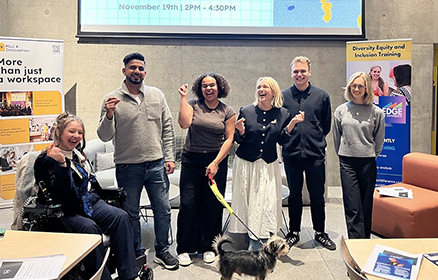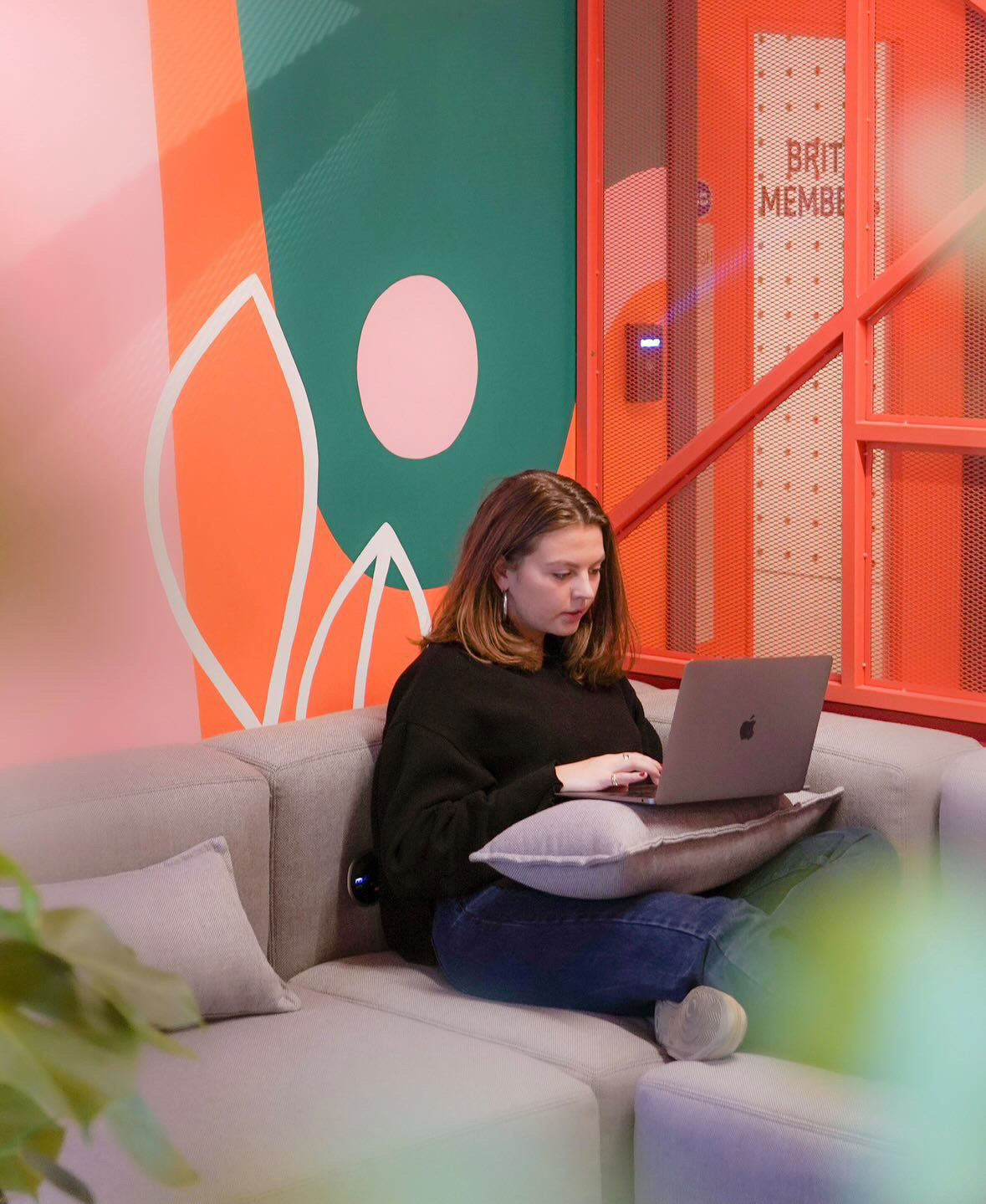Paul Rostas, Co-CEO at Plus X Innovation features in the autumn edition of the Urban Design Journal, uncovering what is happening in the economy to drive entrepreneurship and how the creation of innovation hubs could be the future solution for the UK to compete in the global market.
Written by Amber Mellowship on behalf of Paul Rostas.
Not everyone gets the chance to follow through with their ideas, and often this can be attributed to where they live. When looking across the UK, it is clear there is a lack of funding or appropriate business training in regional cities and towns for early-stage, ambitious businesses.
In our core cities such as London or Manchester there is a strong focus on innovation and entrepreneurship in business districts as a driver for future growth of these opportunities. These are not found in equal measure in other suburbs within those areas, and more widely across the UK. This has a wide knock-on effect not only for economic success and innovation but the perception of our places more widely, creating a dampened sense of confidence for those outside the typical business districts of major cities.
Centralising innovation is no longer seen as a good idea as no-one place has the monopoly on good ideas and people.
Previously for the UK to succeed we thought we had to focus on key areas of London, making it a global megacity in order to drive our economic success and identity, allowing the UK to punch above its weight in the global world. This skewed investment and attention, meaning other places were left behind and entrepreneurs were left without a place or ecosystem in which to develop their ideas and succeed.
Leaders are only now waking up to the fact that innovation and entrepreneurship needs to be available to everyone, and accessible to a diverse range of people and thinkers, who can bring new ideas, skills, perspectives, and experiences to the table.
In the modern, decentralised, world we need to ensure support for innovation and entrepreneurs is available across the country, and in the right locations, to accelerate talent and high-quality jobs. There is also clearly the need for the creation of flexible and creative spaces in a post-pandemic world, to allow this development and collaboration to thrive - creating agglomeration benefits through the sharing of ideas, skills and talent. Research from Clutch1 shows that nearly half of workers (47%) value a community atmosphere at the place where they do their work, so even as we work more flexibly there is a need for a new generation of spaces for innovators to base themselves.
At Plus X Innovation, we are trying to nurture and accelerate these agglomeration effects, create opportunities, and shift the focus to help areas grow through the delivery of a new generation of Innovation Hubs that provide the spaces, facilities and support for ideas to thrive.
It's like building a little bonfire; you get your embers together and create a little bit more heat in those areas so that then you can generate better opportunities and jobs for people.

What is an innovation hub?
At Plus X Innovation, we are redefining the concept of flexible office space. We offer more than just physical workspace; we create buildings which are a departure from a monocultural office or co-working space. Our innovation hubs are specifically designed to their context. They maximise local strengths and skills with incredible technology and state-of-the-art facilities, all supported by our in-house experts. The wealth of facilities can include anything from film and podcasting studios to prototyping and digital fabrication labs. We provide the tools and support people need to drive innovation and growth.
We differentiate ourselves by attracting a talented and diverse innovation community across many specialisms creating a friendly, positive, and motivational atmosphere in our hubs that empowers businesses and professionals to connect, innovate, and create a better future together.
We recognise that success is not solely driven by the provision of space, and therefore we offer integrated business support programmes to our entrepreneurs, often sourcing deep mentor expertise to help businesses on their growth journey. Through the provision of state-of-the-art workshop facilities designed for prototyping, making, and experimentation we help businesses overcome the cost barriers to success.
Our hubs are only successful where they form part of the local innovation/economic ecosystem. They are designed to meet the needs of local businesses in terms of their offer and develop deep and long lasting relationships with local Universities, FE colleges and Chambers of Commerce to ensure our businesses benefit from the best support available but also have a positive impact in their local area.
.jpg)
Who tends to occupy an innovation hub?
We believe everyone has the right to start and excel in their own business and change the world in their own way and therefore our users vary by location and time. We see people and businesses from all walks of life using our hubs, from the early stage idea development phase all the way through to the established operational phase.
Linking back to the value people place on their working environment and the opportunity to engage with other like-minded people, even with changes to working habits the demand for space that supports innovation is strong. Despite opening our Brighton hub during the pandemic, we experienced significant demand from day one – including SMEs wanting to move their businesses from their spare room, start-ups wanting a space to test their ‘side hustle’ and established businesses seeking a more inviting environment for their staff to return to.
Each location will differ in terms of the people who use it, but it is common at any one time for our hubs to accommodate a mix of:
- SMEs seeking flexible and collaborative spaces with facilities to help them thrive. These could be technology startups, creative agencies, product design companies, and niche manufacturing businesses.
- Entrepreneurs, innovators and makers in tech, biotech, hardware, materials, science etc., – anyone who wishes to use our workshops and our specialist facilities (such as media and podcast suites) and take advantage of our innovation programme support.
- Freelancers, sole proprietors, and micro-business owners looking for collaboration and community.
- Large companies and research spinouts looking for satellite offices that want to establish a local presence to tap into regional talent and innovation, and/or more cost-effective spaces outside of London.
Innovation, and our hubs are therefore not solely about startups and entrepreneurs, indeed larger businesses are recognising the multiple benefits of involvement in such spaces.
Larger businesses have a different set of barriers to innovation. Resources are much less likely to be a constraint. Instead, the barriers to innovation are mostly psychological and cultural. The existing business processes, networks, and knowledge provide inertia against change.
The role of innovation hubs and districts makes it easier for larger businesses to engage with startups, which is vital for progress. Eight out of 10 UK corporations see the value of collaboration with startups, with 56% agreeing it is “mission critical2”. We respond to these strategic trends by working across ecosystems and connecting corporates directly with inspiring SMEs, especially within innovation programmes and accelerators.
We find that a rich environment that adapts to the needs of a project team, with a diverse community to throw in new ideas, can make a big difference. We're seeing leading corporates engaging with external innovation spaces, or even creating their own innovation hubs within the corporate space. Whatever your business size, another barrier can be thinking that innovation doesn't fit with your business type or sector specialism – but innovation really should be for everyone.

How can the industry make and create these innovation ecosystems and hubs?
We work with landlords and property developers looking to drive a higher commercial value from their property space. The real estate industry is evolving and the partners we collaborate with are striving to align with occupiers who help them reach their strategic ESG goals. They are interested in innovation and collaboration and are interested in positive impact through the creation of high-value local jobs.
The relationship between Plus X Innovation and a landlord is distinctive, in that mutual commercial benefit is derived from engineering an innovation ecosystem. This is through executing what Plus X Innovation refers to as its ‘Quadruple Helix’3, bringing together partners across education, government, the local community and other business sectors to drive an aligned purpose and commercial success in places where it can add most value.
We have a team of experts, including my co-CEO Mat Hunter (formerly Silicon Valley innovator at IDEO and The British Design Council) who explore areas and work with engaging stakeholders to find how we can best serve local and national needs.
In terms of a practical property opportunity, we often look at part of or a whole building, new or old, but generally between 25,000 to 50,000 square feet.
We also assess opportunities via detailed financial modelling, looking at how best to accelerate a building or area’s ‘place-making’ development, looking at the population, transport links, proximity to local universities, emerging clusters and ecosystems, demand for flex, and number of startups and SMEs.
Returning to the start of the article, we believe that innovation can be a key part of the future for many of our urban centres but for this to happen it will require a different approach to what landowners prioritise in terms of the value their assets create – either in terms of the timeline of financial return or placing greater emphasis on the wider benefits such approaches create to the places they are part of.
Plus X Innovation is on a mission to build an unrivalled global innovation community rooted in towns and cities of all types, we already have two open innovation hubs, in Brighton and Slough, and plan to launch at least 10 more across the UK in the next four years.
We have already proved that the approach works, with our hubs already having created over 1,000 high-value jobs, supported businesses to raise over £165mn in investment and delivered over £25mn of business support and innovation programmes. The impact this has on the places we operate is significant, our Brighton hub is estimated to have created over £32.5mn in wider socio-economic benefits in its first 12 months of operation whilst our Slough Hub received a Property Week “Deal of the Year” award in 2024 for driving positive socio-economic change and entrepreneurship.
References:
1 https://clutch.co/hr/resources/future-of-work-how-workspaces-meet-worker-needs
2https://standard.co.uk/news/tech/europe-french-asia-b1071048.html
3 The ‘Quadruple Helix’ refers to describes university-industry-government-public-environment interactions within a knowledge economy. Plus X Innovation work across the quadruple helix: collaborating with 1) local businesses, 2) communities, 3) local and national government, and 4) educational institutions.



.jpg)



.jpg)
.png)






.jpg)


.jpg)
















-compressed.jpg)



.jpg)









.jpg)

.jpg)
-compressed.jpg)
.png)
-medium.jpg)






.jpg)






.jpg)




.jpeg)


.jpg)




.jpg)

















%20(1)-compressed.jpg)

